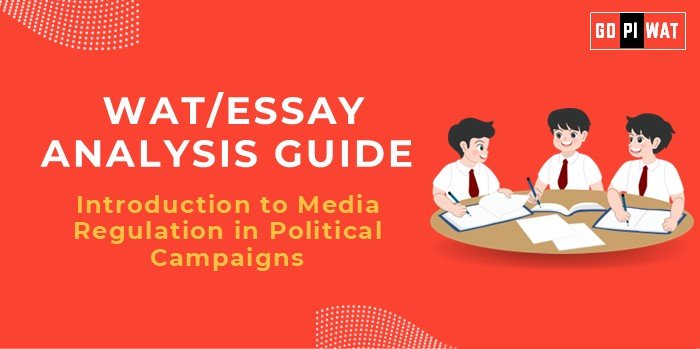📋 Written Ability Test (WAT)/Essay Analysis Guide: Understanding the Importance of Media Regulation in Political Campaigns
🌐 Understanding the Importance of Media Regulation in Political Campaigns
Media is a cornerstone of democracy, shaping voter perceptions and enabling informed decision-making. For B-school students, understanding media regulation highlights lessons in governance, ethical leadership, and stakeholder dynamics.
📝 Effective Planning and Writing
- ⏳ Time Allocation:
- 📌 Planning: 5 minutes
- ✍️ Writing: 20 minutes
- 🔍 Review: 5 minutes
- 💡 Preparation Tips: Gather examples of media influence (e.g., elections in the U.S., UK, and India) and balance ethical arguments with practical considerations.
💡 Introduction Techniques for Essays
- 🌀 Contrast Approach: “While media empowers voters with information, its unregulated role during campaigns has led to misinformation and undue influence.”
- 💡 Solution-Based Approach: “Regulating media in campaigns can protect democracy, but it must avoid stifling freedom of speech.”
- 📜 Historical Approach: “From traditional press to digital platforms, media’s role in political campaigns has evolved, raising critical regulatory questions.”
🛠️ Structuring the Essay Body
- 🏆 Achievements:
- ✅ Enhanced voter education and engagement.
- 🌐 Innovative outreach through social media, leveling the field for smaller campaigns.
- 📚 Example: Finland’s media literacy programs reducing fake news impact.
- ⚠️ Challenges with Comparative Analysis:
- ❌ Fake news influencing election outcomes (e.g., Brexit misinformation campaigns).
- 📣 Political bias in major media outlets (e.g., U.S. cable news networks).
- 🚀 Future Outlook:
- 💡 Recommendations for balanced regulation (e.g., independent media councils).
- 🔍 Leveraging technology for transparency and accountability.
📄 Concluding Effectively
- ⚖️ Balanced Approach: “Media regulation in political campaigns should strike a balance between ensuring transparency and upholding freedom of expression.”
- 🌐 Global Comparison: “Countries like Germany show how regulation can work effectively without stifling press freedom.”
🔎 Analyzing Successes and Shortcomings
- 💪 Achievements: Greater transparency, enhanced voter trust, innovative outreach.
- ❌ Challenges: Polarization, censorship risks, and regulatory challenges.
- 🌍 Global Context: Germany’s effective regulations vs. the unregulated media in the U.S.
💡 Recommendations for Sustainable Progress
- 📋 Create independent oversight bodies to regulate political advertising and media content.
- 📚 Promote media literacy programs to empower citizens against misinformation.
- 💰 Enforce transparency in campaign finance, especially for online platforms.
✍️ Sample Short Essays
- ⚖️ Balanced Perspective: “While media regulation curtails misinformation, overregulation risks undermining democracy.”
- 🌟 Solution-Oriented: “Independent oversight and media literacy can ensure ethical campaigning without stifling freedom.”
- 🌍 Global Comparison: “Germany’s strict media laws and the U.S.’ laissez-faire approach demonstrate contrasting impacts on political transparency.”
These guides offer structured frameworks for GD and WAT preparation, ensuring comprehensive analysis and practical utility.


